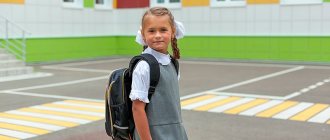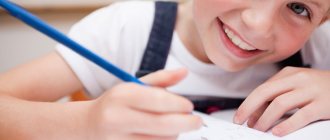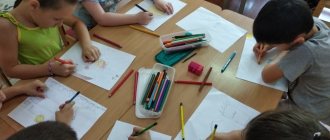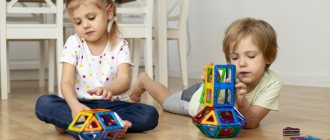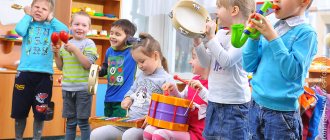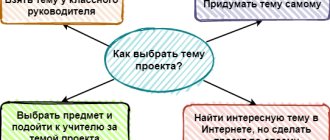When to start preparing
Going to school is always exciting for both adults and children. Some parents begin preparation in advance so that by the first grade the child has already mastered the skills of reading, writing and counting. There is another category of adults who believe that teaching everything is the task of teachers. Such parents spend almost no time preparing their children for school. Which one is right? There is no correct answer, as well as a clear solution. Each family chooses for itself, based on its capabilities and the abilities of the child.
What happens if a child is not prepared for school? Nothing terrible. In first grade, children will be taught to read, write, and count. But in this case, parents should be prepared that the child may lag behind classmates who have already mastered these skills. A first grader who is learning about letters and counting will have more difficulty with assignments, and homework will take longer. This situation is not conducive to success and can result in such a strong decrease in interest and motivation to learn that the child no longer wants to go to school. Therefore, most parents try to prepare their children for first grade in advance.
What do you need for school?
Preparing for school is a very diverse process in which it is important to take into account the knowledge, skills and abilities of the future first-grader.
Psychological maturity
Assess how much the child understands that now his life will include not only games, but also educational activities.
First, pay attention to the emotional-volitional sphere: the future first-grader must control emotions. The inability to contain joy, anger, excitement, and resentment can affect relationships between classmates and affect the quality of studies.
Secondly, train your preschooler’s concentration and perseverance: teach your child to complete things he has started, without leaving them to the last minute. Organize home “lessons” - draw, sculpt, do shading, but always at the table and for 15-20 minutes, without interrupting for other tasks. Consistency and habit are important - to work strictly at the workplace, concentrating on a specific task. Household chores also help well in developing this skill: taking care of a pet, cleaning your room or watering flowers.
Do exercises to prepare for school from Ikyusha
Mathematics
Reading
The world
Logics
English language
Physical training
A first-grader will spend a lot of time on the move: the road to school, recess, outdoor games, so cultivate physical endurance in children.
In this endeavor, a personal example is important: move, spend time with children outside, play active games. If possible, send your child to a sports section before starting school. This way the baby will get used to regular classes and systematic physical activity.
Compliance with the daily routine can also be attributed to such preparation. Children who have not been accustomed to this find it much more difficult to adapt to the school routine. This is especially true for preschoolers who do not attend kindergarten. At least a few months before school, start waking up your child at the same time, and also try to organize meals, getting up and going to bed on a clear schedule.
Teach preschoolers discipline: washing and dressing themselves, making the bed, putting away toys and books. To do this, come up with an exciting game where all actions will become part of a big adventure quest: complete them at speed, earn bonuses, share achievements with each other, add funny rituals. Be sure to praise your child if he did it faster than usual, and support him if he was a little late today. The main thing is to maintain a good mood! In this playful form, you can unobtrusively accustom a preschooler to a routine and later to get ready for school independently.
Intellectual development
This is not only the ability to read, write, count (after all, this can be taught at school). It is more important to teach a child to reason, compare facts, be able to express his thoughts and give reasons for them.
This will require logic and speech. Logical thinking helps to analyze and compare information, find and apply non-standard solutions, and developed speech will allow you to communicate more comfortably in a team and in class. The child will be able to easily express his thoughts and defend his point of view. Then communication will bring pleasure and joy.
Memo for parents of future first-graders
Parents should think not only about the child’s intellectual readiness for school, but also about personal and psychological readiness. Maintain his physical health.
At home, develop in your child:
- independence. Teach your child in advance to the idea that he needs to study, and not mom or dad. And he must carry out all educational duties independently: collect his briefcase, wash, get dressed, take care of his school things. Your task is to control the child at first. Don’t go too far – the child should know that at any time he can turn to you for help with any question. But you will not complete tasks for him. Understand this rule yourself and never deviate from it, otherwise your child’s studies will be a nightmare for you. In the summer before school, teach your child to wash himself, brush his teeth, and handle buttons, ties, and laces well.
- Perseverance . It is difficult for a small child to focus his attention on a school task for 30 minutes, as required by school standards. If your child went to kindergarten, he has probably already acquired this skill. But if the child was raised at home, then this skill needs to be developed. You need to start with 15 minutes of continuous activity of the child’s daily classes, gradually increasing the time during the school period to 30 minutes. The earlier you start practicing (recommended from 3-4 years old), the more diligent your child will be.
- Friendliness. Set your child up to expect that there will be many interesting and good kids in the class. Explain that being friendly and responsive is much more pleasant. Swearing and fighting is unacceptable and such behavior will be condemned by the teacher. Discuss topics of good and evil with your child. Explain that lying is bad. But also explain to your child that there are important topics that must be told to adults, for example, if someone offends a weak person.
- Politeness . Teach your son or daughter the rules of etiquette. Teach him to say “hello”, “goodbye”, “thank you” and “please” by showing him by example how it should be.
- Behavior . Tell your child about the rules of behavior at school. A very important point is behavior during changes. Share your good memories of your school life. The child must be mentally prepared for school communication. And know in advance: what is possible and what is not.
How to prepare your child for school on your own?
Studying at school changes the entire routine life of a child. Is it possible to prepare your baby for a new stage on your own? Certainly! The main thing is to stock up on time, desire and patience. Preparing for school is a long process, which consists not only of learning to read and write, but also of psychological support for the future first-grader.
When choosing to prepare for school in a developmental studio or preparatory class, it is important to understand that only knowledge can provide there. They do not teach discipline and daily routine. But the preparation itself in the studio is more effective, because the preschooler is in a group and quickly learns new information.
For busy parents, there is another alternative - online classes. Is it possible to entrust this important process to online child development services and be confident in the results? More likely no than yes.
The advantage is that the child will study independently, because all classes are designed in an accessible and fun way. But adults must monitor the learning process and check how well the preschooler learns information.
Therefore, online services are excellent assistants, but they cannot completely replace classical training. The best training option is combined, when the child studies at home and in a preparatory studio or on child development sites.
With whom and where to study?
At the kids' club? Privately with a teacher? In preparatory groups at school?
It's not about the premises, but about the specialists who will do their job in any institution.
The “advantages” of group classes at school are the opportunity to see the school and its everyday life, so to speak, from the inside, the opportunity to meet the future teacher, and for the child to get used to the environment. This is especially important for the overwhelming majority of children at home who did not attend kindergarten.
The desire of many parents to have their child deal with individually is not always justified.
Indeed, during an individual lesson, all the teacher’s attention is directed to one child. But at the same time, the child is tense, as he must be in a state of constant attention, and this is very difficult.
Based on many years of practice, I see that classes in a small group (4-5 people) are much more productive. With so many children, my attention is enough for everyone, I see everyone and can help everyone in time. On the other hand, my attention is distributed evenly, and the children feel less stressed, learn to cooperate, hear each other, which is also one of the components of readiness for school.
If possible and necessary, you can combine group classes with individual classes.
School preparation program from IQshi
The website for the harmonious development of IQsha will help you effectively prepare for school, anywhere in the world. IQsha offers many exercises in a playful way to develop logical thinking, speech, reading, and counting skills. This way you can diversify the learning process and make it easier and more fun.
The most important thing is to be attentive and patient with your child, take into account his wishes, and do not race for success, looking at the achievements of other children. First of all, it depends on the parents what kind of attitude the future first-grader will have towards school. Be warm, accepting mentors, talk to your child more often and be interested in what emotions he is experiencing, trying to show as much participation as possible. Don't make school preparation your number one goal. Play, walk, have fun and turn your lessons into fun, playful activities that will help you develop your skills in a fun and stress-free way.
As if there was no preparation at all
There are many moments in our ordinary home life that can rightfully be considered preparation for school and which naturally fit into the life of any family.
Walking, skating, skiing, swimming - everything that improves health is very important for a child’s future school life. Encourage activities that develop thinking, imagination, and motor skills: drawing, modeling, designing, embroidering.
The best way to develop speech, attention, imagination, and memory is to read books to your child. Read every day, read even if your child already knows how to read. Your reading will not replace either watching cartoons or listening to tapes.
Cooperate with your child, do not refuse his help in adult matters: from repairing a faucet to making dumplings. Be prepared to help yourself if necessary.
Play games that have clear rules.
Pay special attention to the child’s desire to learn new things, the ability to communicate and find a common language with children and adults, the ability to overcome difficulties, and bring the job started to completion.
